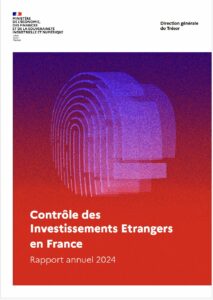
FDI Screening in France in 2024: Annual Report 2025
The publication of the 2025 annual report on FDI screening in France by the Directorate General of the Treasury provides a detailed perspective on the evolution of this strategic regulatory framework. Covering data collected between January 1 and December 31, 2024, the report highlights trends, the most affected sectors, and the way French authorities strive to reconcile economic attractiveness with the protection of the Nation’s fundamental interests.
Context and Economic Sovereignty Challenges
The year 2024 confirmed the need for France to strengthen its FDI screening in France. Against a backdrop of geopolitical tensions and intensified global economic competition, the protection of strategic sectors and sensitive know-how remains a top State priority.
Over the years, FDI screening in France has expanded to cover not only defense and national security but also energy, public health, food security, critical infrastructure, and cutting-edge technology research. The primary purpose of FDI screening in France is to preserve economic sovereignty while keeping the French market attractive for international capital.
Key Developments and Figures in 2024
In 2024, 392 filings were submitted under FDI screening in France, compared with 309 in 2023, reflecting a significant increase in activity. Of these, 337 decisions were issued:
-
182 authorizations were granted, 99 of which were conditional to safeguard national interests.
-
73% of preliminary review requests concluded that the transaction fell outside the scope of FDI screening in France.
-
Six refusals were issued over the past three years, often following investors’ voluntary withdrawals in light of the contemplated conditions.
Most reviewed transactions involved essential infrastructure, goods, or services, followed by R&D activities in critical technologies such as cybersecurity, biotechnology, or semiconductors. The majority of investors originated from outside the European Union (65%), led by the United States, the United Kingdom, and Switzerland.
These figures confirm that FDI screening in France is an active yet proportionate instrument, combining attractiveness with economic security.
Process and Conditional Authorizations
FDI screening in France is structured around a two-phase process:
-
Phase 1 (30 business days): Preliminary review by the Directorate General of the Treasury and the Interministerial Committee for Foreign Investments in France (CIIEF).
-
Phase 2 (45 additional business days): In-depth review when the transaction poses potential risks to public order, public security, or national defense.
Authorizations may be granted outright or subject to conditions. In 2024, 54% of approvals were conditional. These conditions aim to:
-
Ensure continuity of strategic activities on French territory.
-
Safeguard sensitive knowledge and know-how.
-
Regulate governance and voting rights of foreign investors.
-
Maintain regular State oversight over compliance with obligations.
A mechanism exists to revise conditions if economic, regulatory, or ownership circumstances evolve. In 2024, eight revision requests were processed, seven of which were approved, demonstrating the flexibility of FDI screening in France.
Focus on Sensitive Sectors
The report underlines the growing importance of critical technologies in FDI screening in France:
-
Biotechnology and healthcare account for a significant portion of screened transactions.
-
Cybersecurity, semiconductors, robotics, and low-carbon technologies are under heightened scrutiny.
-
R&D activities are now included within the scope of FDI screening in France, even before reaching the industrial production stage.
Additionally, FDI screening in France applies to distressed companies. In 2024, 17 decisions concerned entities undergoing insolvency or restructuring. Coordination with the CIRI, regional economic directorates, and court-appointed administrators allowed timelines to be adapted, balancing speed with the protection of national interests.
European and International Dimension
Since the entry into force of Regulation (EU) 2019/452, France has actively participated in the EU cooperation mechanism on FDI. In 2024:
-
The European Commission and Member States exchanged information on 1,808 transactions.
-
French notifications under FDI screening in France contributed to improving collective transparency and protection at the European level.
-
An ongoing review of the regulation aims to ensure all EU Member States implement national FDI screening in France-equivalent frameworks and to optimize cooperation.
Through the Directorate General of the Treasury, France continues to play a leading role in the G7 and in EU working groups, reinforcing the international dimension of FDI screening in France.
Conclusion and Outlook
The 2025 report confirms that FDI screening in France in 2024 has become a cornerstone of the country’s economic sovereignty policy. The increase in processed cases, the proportion of conditional authorizations, and the vigilance toward strategic sectors demonstrate the efficiency of a system that is both protective and investor-friendly.
In 2025, priorities for FDI screening in France will include:
-
Publishing new guidelines to enhance the predictability of the regulatory framework.
-
Adjusting authorization conditions to evolving critical technologies and geopolitical risks.
-
Strengthening France’s role in European coordination for FDI screening in France.
By maintaining this balanced approach, France intends to remain a preferred destination for foreign investors while preserving its national interests and strategic value chains.
Comparative Synthesis of FDI Screening in France (2021–2023)
Between 2021 and 2023, annual reports from the Directorate General of the Treasury illustrate the progressive intensification of FDI screening in France, marked by:
-
An expansion of the regulatory scope.
-
A more structured review and monitoring process for sensitive transactions.
Key trends include:
-
Stable case volumes but an increasing share of conditional authorizations under FDI screening in France.
-
Higher proportion of non-European investors, confirming the system’s relevance to extra-EU capital flows.
-
Sectoral expansion to include biotechnology, renewable energy, critical raw materials, and photonics.
-
Procedural maturity, with guidelines and the IEF digital platform improving predictability for foreign investors.
Quantitative and Qualitative Evolution
-
2021: 328 filings; 124 authorizations (54% conditional).
-
2022: 325 filings; 131 authorizations (53% conditional).
-
2023: 309 filings; 135 authorizations (44% conditional).
These figures highlight the stability of FDI screening in France and a slight decrease in conditional approvals in 2023, reflecting a refined balance between vigilance and proportionality.
Requests for preliminary review also declined (41 in 2021 to 27 in 2023), suggesting that foreign investors better understand the scope of FDI screening in France thanks to improved guidance and proactive engagement with the Treasury.
Comparative Analysis and Future Perspective
The comparative analysis of 2021–2023 shows that:
-
FDI screening in France has reached operational maturity, with stable case management and improved post-authorization monitoring.
-
The regulatory focus increasingly integrates civilian strategic sectors, confirming that economic security is inseparable from national security.
-
The digital IEF platform and guidelines enhance the transparency and predictability of FDI screening in Francefor foreign investors.
Looking forward to 2024–2025, the inclusion of critical raw materials and low-carbon technologies indicates that FDI screening in France will be closely tied to energy and digital transitions, cementing its role as a pivotal tool of economic sovereignty
Go to the Ministry of the Economy’s website and download the report.

Our Expertise
For over 20 years, Relians, a strategic and institutional advisory firm, has been assisting companies facing these challenges. Relying on a deep understanding of the applicable regulations, administrative practices, and official guidelines, we help our clients structure their transactions securely, in full compliance with regulatory requirements, and in a spirit of constructive dialogue with the French authorities.
Relians, a specialist in FDI screening in France.

